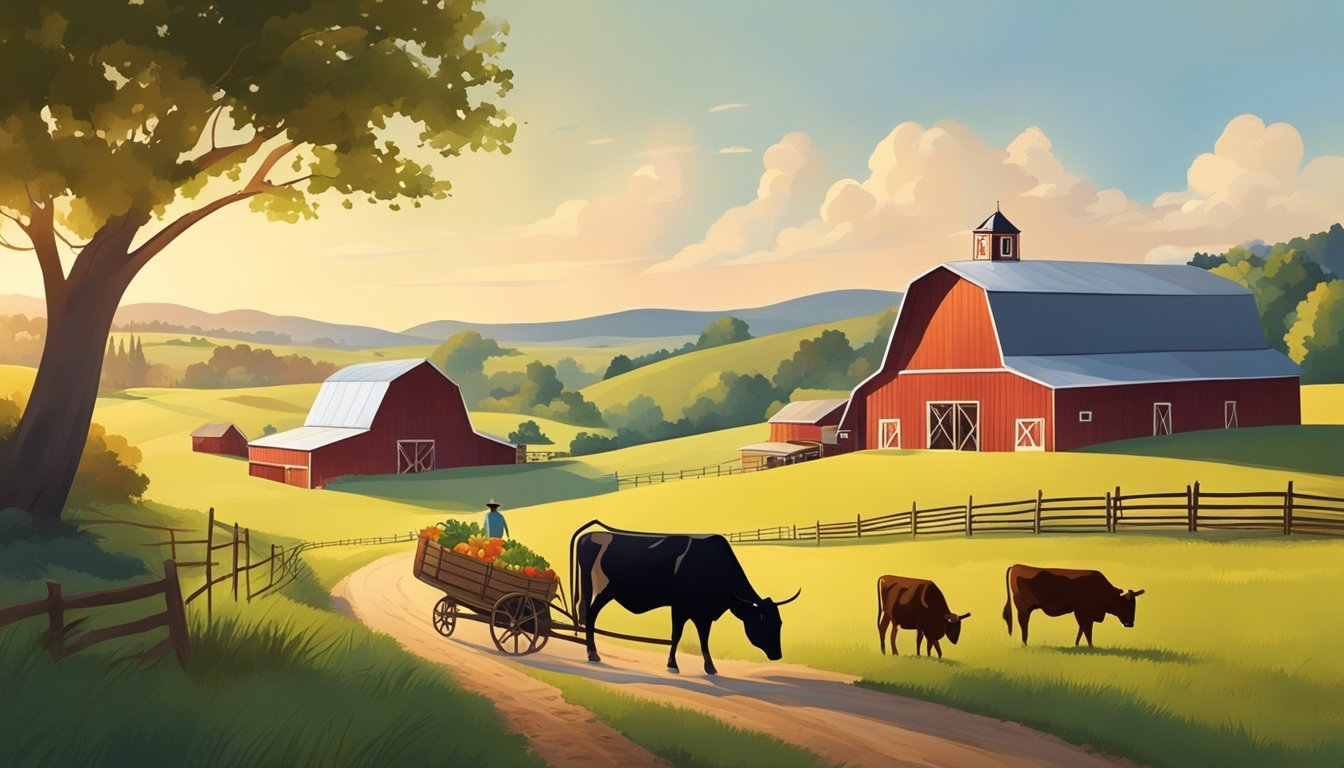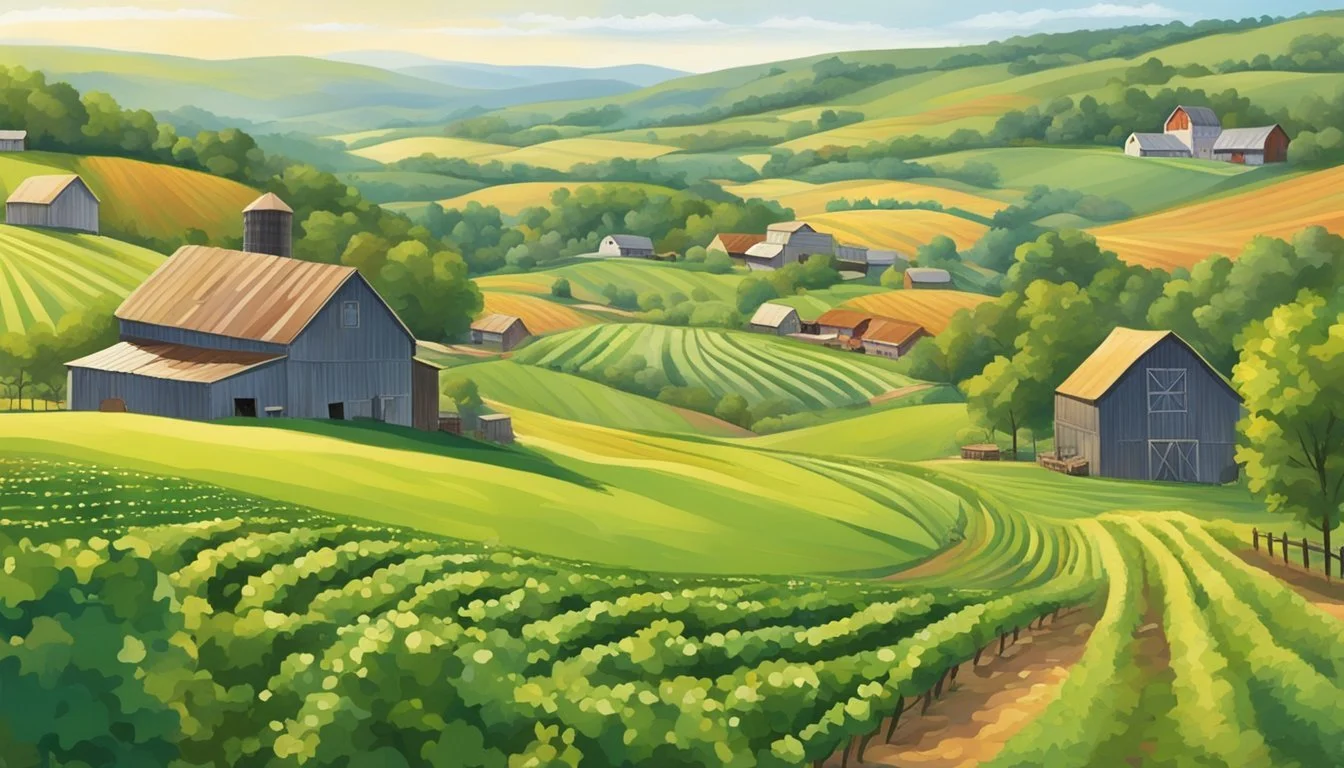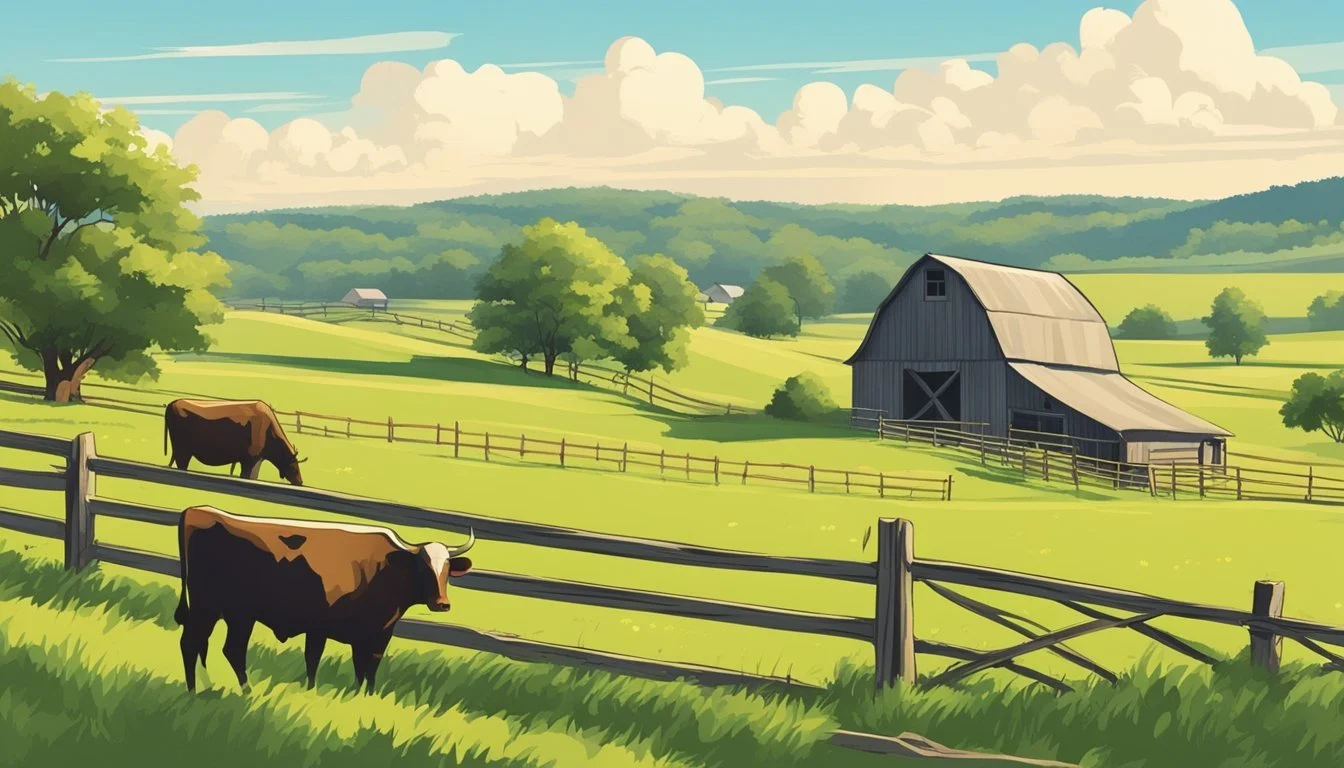Agritourism in Oklahoma
Embracing Rural Adventure and Farm Experiences
Agritourism represents a vital intersection of agriculture and tourism, offering visitors a chance to immerse themselves in the heart of agricultural life. Oklahoma, with its rich farmland and diverse agricultural practices, has embraced this concept, providing an array of experiences that connect people with the state's farming heritage. From wine trails to jelly-making workshops, Oklahoma Agritourism presents a unique opportunity for both locals and tourists to explore the rustic charm of countryside living, learn about farm-to-table processes, and participate in hands-on agricultural activities.
The state's agritourism ventures go beyond traditional farm visits, including commodity-based experiences at lodges and wineries, where insight into the production processes of local specialties is offered. Oklahoma extends an invitation to engage with its agricultural community through various trails designed to showcase different aspects of the industry. Visitors can savor the local flavors with tours and tastings, or gain knowledge directly from the producers who fuel the state's agritourism.
This growing sector not only enriches the travel experience for visitors to Oklahoma but also provides additional income streams for farmers and fosters a deeper connection between urban dwellers and rural life. Through agritourism, Oklahoma is bridging the gap between agriculture and the public, reinforcing the state's position as a destination for authentic farm experiences and agricultural education.
The Rise of Agritourism in Oklahoma
Agritourism in Oklahoma has emerged as a dynamic fusion of the state's robust agricultural heritage and the growing demand for authentic travel experiences. It offers farmers diversified income sources and presents tourists with unique rural attractions.
Historical Context
Initiatives in Oklahoma have increasingly centered on leveraging its rich agricultural past to foster tourism. Historically, the state's economy was deeply rooted in farming and ranching, but recent shifts have introduced the concept of agritourism as a contemporary adaptation of this tradition. Farmers and ranchers have started to see agritourism not only as an alternative revenue stream but also a way to preserve their way of life for future generations.
Consumer Trends
The consumer's quest for authentic, firsthand experiences has played a pivotal role in the ascendance of agritourism in Oklahoma. Key trends include:
Educational tours: Visitors are eager to learn about the food production process, from farm to table.
Lodging: A growing percentage of agritourism businesses now offer on-site accommodations, providing an immersive rural experience.
Market experiences: Approximately one-in-four agritourism operations in Oklahoma provide market experiences, allowing visitors to purchase fresh, locally sourced products directly from their origin.
Wineries: They are an important niche in Oklahoma's agritourism, offering tastings and vineyard tours.
These subsections align with a consumer base that values sustainability, authenticity, and local flavor, further propelling the agritourism sector in Oklahoma.
Oklahoma's Agritourism Attractions
Oklahoma offers a diverse range of agritourism attractions that cater to a variety of interests, from hands-on harvesting at u-pick farms to interactive experiences at working farms and ranches.
Popular Farms and Ranches
Oklahoma Trails: Visitors can explore working farms and ranches, many of which provide educational tours showcasing Oklahoma's agricultural practices and heritage.
Wedding and Event Venues: Some ranches double as venues for weddings and events, offering a rustic and scenic backdrop.
U-Pick Farms and Orchards
Berry Picking: Farms like Wild Things Farm allow guests to pick their own fresh berries, providing a fun and engaging outdoor activity.
Fruit Orchards: Places like Livesay Orchards offer a selection of peaches, watermelons, and other fruits for personal picking.
Vineyards and Wineries
Oklahoma Vineyards: The state's vineyards produce an assortment of local wines, opening their doors for tastings and tours.
Wine Events: Many wineries host events to educate visitors about the winemaking process and the flavors unique to Oklahoma.
Corn Mazes and Pumpkin Patches
Corn Mazes: They offer a family-friendly challenge, with intricate designs carved out of fields of tall cornstalks.
Pumpkin Patches: Visitors can select their ideal pumpkin during the fall season, often coupled with hayrides and other festive activities.
Hunting and Fishing Opportunities
Controlled Hunts: Certain farms and ranches organize controlled hunting expeditions for a range of wildlife.
Fishing: Some agritourism sites include fishing experiences, where guests can fish in stocked ponds or rivers.
These diverse attractions demonstrate Oklahoma's commitment to blending agricultural practices with tourism to create memorable experiences for visitors.
Agritourism Experiences
In Oklahoma, agritourism experiences are diversifying the traditional farm and ranch activities, providing visitors with a variety of educational, recreational, culinary, and shopping opportunities that embody the authentic spirit of the state’s rural life.
Educational Activities
Teachable moments abound in Oklahoma's agritourism ventures, where visitors can engage in hands-on learning about agriculture and livestock. Children and adults alike can participate in educational tours that highlight the importance of agriculture. These experiences are often coupled with farm stays where guests can immerse themselves in farm life, assisting with chores like feeding animals or collecting eggs.
Recreational Activities
Oklahoma's natural beauty can be enjoyed through a range of recreational activities. Visitors can go trail riding on horseback to explore scenic trails, or partake in seasonal activities like hay rides during harvest festivals. Agritourism farms sometimes feature outdoor mazes and play areas to enhance the visitor’s interaction with nature.
Events and Festivals
Farms across the state host events and festivals that capture the essence of the agricultural calendar. These can include pumpkin patches and harvest festivals in the fall, or spring events that showcase the beginning of the growing season. These festivals frequently include live music, craft booths, and other entertainment, offering a community-centric experience.
Culinary Experiences
Agritourism in Oklahoma extends to culinary experiences that showcase local flavors. Farms offer tastings of their products, which might include homemade jellies, wines, or craft beers. Cooking classes and farm-to-table dining events give visitors a firsthand appreciation of the local produce and the culinary traditions that make up Oklahoma’s food culture.
Shopping and Direct Sales
Many Oklahoma agritourism sites include a gift shop or farm store where visitors can purchase unique local products. These direct sales allow guests to take a piece of their agritourism experience home with them, whether it's handcrafted goods or fresh produce. Seasonal markets and fairs also provide opportunities for guests to support local agriculture and artisans.
Planning Your Agritourism Venture
In Oklahoma, successful agritourism ventures integrate sound business planning with strategic marketing efforts to attract customers and maximize profitability.
Understanding Agritourism Resources
Oklahoma State University and the Oklahoma Department of Agriculture provide extensive resources to assist individuals in navigating the agritourism industry. They offer research, guides, and educational programs that can be crucial for understanding the operational landscape and the regulatory requirements. It is essential for entrepreneurs to leverage these resources to ensure a well-informed start to their ventures.
Business Planning and Strategy
Creating a business plan that outlines the strategy for generating revenue is paramount. Ventures should start with a solid idea, perfect it, and then consider expansion. The plan must detail the financial aspects, from initial investment to projected cash flow, and include potential income sources. A well-thought-out strategy also takes into account the seasonal nature of agritourism and plans for revenue stability throughout the year.
Marketing and Customer Relations
Effective marketing, especially through social media and other digital platforms, is key to building a customer base and promoting an agritourism venture. By engaging with potential visitors online, an enterprise can boost its visibility and attract more guests. Building strong customer relations is equally important; feedback from visitors can offer valuable insights for improving offerings and driving repeat business. It's a continuous cycle of engagement, feedback, and improvement that helps sustain and grow the venture.
Economic Impact of Agritourism
Agritourism significantly contributes to the economic vitality of Oklahoma, enhancing the local economies through increased revenue streams and employment opportunities. It also serves an educational role, increasing awareness of agricultural operations.
Local Economy and Employment
In Oklahoma, agritourism has become a valuable asset to local economies, injecting a sizable income through tourism-related activities. Employment opportunities are created as agritourism demands a workforce in hospitality, tour guiding, and event management. This sector supports local labor, offering jobs often associated with lodging and market experiences, which directly benefit the community's economic status.
Farm Revenue Diversification
Farmers in Oklahoma have embraced agritourism as a means to diversify their income. Traditional operations focused on cattle, fruits, and vegetables now integrate agritourism, adding additional revenue streams. These may include on-farm lodging, pick-your-own fruit and vegetable experiences, or product sales directly to customers. By offering such diverse experiences, farms can reduce risk and increase profitability.
Agricultural Education and Awareness
Agritourism fosters a connection between producers and consumers, elevating awareness of agricultural practices and food production. Educational tours and interactive experiences offer hands-on learning about the planting, harvesting, and handling of farm products. This exchange not only boosts income but also enhances customer appreciation and support for local agriculture.
Challenges and Opportunities
Agritourism in Oklahoma presents a dynamic blend of challenges and opportunities for local producers and consumers. It allows for innovative agriculture-education interfaces but also requires careful navigation of legal frameworks and community relationships.
Sustainable Practices
Producers engaging in agritourism must adopt sustainable practices to ensure the longevity of their operations and the preservation of Oklahoma's natural resources. Opportunities arise from:
Education: Demonstrating eco-friendly farming techniques.
Consumer Experience: Offering hands-on sustainable farming experiences can foster appreciation and consumer loyalty.
Key challenges include:
Cost: Implementation of sustainable methods can be initially high.
Knowledge: Continuous education is needed to stay abreast of evolving sustainable practices.
Legal and Liability Issues
Navigating legal and liability issues is a must for agritourism operators. They encounter opportunities such as:
Diversification: Liability concerns can drive innovation in activities offered.
Partnerships: Collaborating with insurance firms for tailored products.
But they face challenges like:
Complex Legislation: Ensuring compliance with zoning, health, and safety regulations.
Liability: Adequately protecting against accidents and ensuring visitor safety.
Community Development
Agritourism fosters community development through:
Job Creation: Offering new roles within rural communities.
Local Economy: Direct sales provide farmers with an alternative income stream and stimulate local businesses.
However, this also encounters challenges in:
Infrastructure: Upgrading access and facilities to accommodate visitors.
Relations: Balancing tourist interests with those of local residents.
Future Trends in Agritourism
The agritourism sector in Oklahoma is poised to evolve with the integration of new technologies and collaborative strategies, aiming to enhance consumer engagement and provide innovative experiences.
Innovation and Technology
Agritourism operators are embracing technology to create immersive experiences for visitors. They might utilize virtual reality (VR) to offer virtual farm tours or agricultural processes demonstrations. The introduction of precision agriculture tools can showcase cutting-edge farming practices. Additionally, the use of online booking and management systems simplifies the process for visitors to schedule their agricultural experiences.
VR/AR: Virtual crop tours, real-time agriculture lessons.
Precision Agriculture: Demonstrations on GPS-guided equipment, drone farming.
Online Platforms: For seamless scheduling and customer management.
Collaboration with Tourism Sectors
Collaboration between agritourism businesses and broader tourism sectors is expected to develop. Joint promotions with local hotels or travel agencies could package farm stays with regional attractions. Agritourism ventures may partner with local culinary institutes or wine associations, creating an integrated experience that highlights Oklahoma's local produce and gourmet offerings.
Joint Promotions: Paired offers with hotels, travel guides.
Local Partnerships: Food and wine pairings with culinary events, festivals.
Consumer Engagement Strategies
Agritourism businesses can leverage social media platforms to actively engage with potential visitors, sharing daily farm activities and harvesting processes, or hosting live Q&A sessions. Encouraging user-generated content by inviting visitors to share their experiences on platforms like Instagram can significantly amplify reach and attract new demographics.
Social Media Campaigns: Use of real-time engagement tools, visitor stories.
User-Generated Content: Hashtags, photo contests to encourage sharing.
By optimizing these areas, Oklahoma's agritourism can continue to grow, offering dynamic, educational, and enjoyable experiences that connect consumers with the state's rich agricultural heritage.
Supporting Local Agritourism
Agritourism in Oklahoma thrives on the support from the community and the collaboration between consumers, local producers, and state entities dedicated to promoting the sector.
Community Involvement
The engagement of the community is vital to the success of local agritourism. They can participate by attending events like the Oklahoma Local Agriculture Summit, and exploring various agritourism trails. Community members are encouraged to visit farmers markets, which serve as a hub for direct sales from local farmers, offering fresh produce and unique agricultural products.
Supporting Oklahoma Producers
Oklahoma's agritourism is bolstered by the direct support of its producers. Farm stays, u-picks, and farm tours offer hands-on experiences that bring consumers closer to the source of their food. By choosing to buy directly from these producers at farmers markets or on-site, consumers contribute to the local economy and help maintain the state's agricultural heritage.
Agritourism and State Promotion
The Oklahoma Department of Agriculture, Food and Forestry actively promotes agritourism as a key component of the state's economy. It partners with entities like the Oklahoma Local Ag Collaborative to highlight the importance of agritourism and provide resources to Oklahoma producers. These partnerships work to ensure that visitors and locals alike are aware of and can partake in the agricultural adventures that Oklahoma has to offer.
Conclusion
Agritourism in Oklahoma represents a synergy between agriculture and tourism, offering diverse opportunities for both local agricultural producers and visitors. It stands as a viable stream of income for the state's farmers and ranchers. These enterprises allow visitors to engage with rural life, often for the first time, bringing educational and recreational experiences to urban populations.
Through activities like farm stays, corn mazes, and wine tastings, Oklahoma's agritourism connects people with the source of their food and the natural environment. The trend also boosts local economies and supports small businesses, reinforcing the state's rural heritage.
To summarize, Oklahoma's embrace of agritourism benefits residents and tourists alike, providing a unique blend of educational, economic, and experiential advantages aligned with the state's agricultural roots. The industry continues to show promise for growth and sustainability, strengthening the bond between agriculture and tourism.




